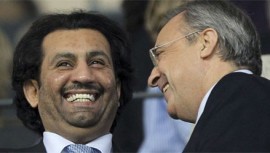
It was while perusing the scoreline of Sunday’s Manchester derby – in which a team of petrodollar-financed stars had trounced the English champions 6-1 – that my mind turned to La Liga. By a twist of fate, something akin to a parallel fixture had been played the day before in Spain, between Real Madrid and Málaga.
Real Madrid, like Manchester United, was the big, established power, with a glittering history, a formidable manager and a team built on tradition, as well as money. Málaga was the Manchester City of the piece: a side with no trophies to boast of (at least in recent decades) but with oodles of money provided by a rich foreign owner – Abdullah bin Nasser Al-Thani of Qatar.
Sadly, that’s as much as the two games had in common. I had hoped that José Mourinho’s unpleasant sniping at Málaga’s Manuel Pellegrini last season might have galvanised the unflappable Chilean’s team. But no. By half-time, Madrid had flattened Málaga 4-0.
It was another slap in the face for those who would like a more open title race in Spain than those we have seen over the last decade (Real Madrid and Barcelona have taken all the honours since Valencia won the league in 2004). There will be those who argue that actually this year La Liga is competitive, pointing to Levante’s extraordinary season so far in which they have been at or near the top of the league standings throughout the autumn. But a look at the last day of the liga season over recent years tells us that, come May, the likes of Levante (and Sevilla and Valencia) will be far off the pace of the big two.
Last season, third-placed Valencia trailed Barcelona’s champions by 25 points; the season before, the same team came in third, 28 points behind Barça; in 2009 Sevilla were third, a more laudable 17 points back. In 2008, Villarreal broke the duopoly, beating Barcelona to second spot, albeit eight points behind the leader; and in 2007 Sevilla may have come in third, but with 61 points, they were only four behind champions Barcelona.
All of this seems to suggest that while only a few years ago there were two of three teams capable of mixing it with the big boys, now nobody can. This of course is not simply an indictment of the league’s other 18 teams and Spanish football’s TV money distribution. It also reflects how, on the whole, Barcelona and Real Madrid have improved, particularly since Pep Guardiola and Mourinho took over as their respective coaches.
A fascinating article in The Guardian by Jonathan Wilson examines the competitiveness of the Premier League and others leagues around the world (Russia and Brazil are the really competitive ones, he decides). According to his numbers-based calculations, the English and Italian leagues do pretty poorly, with Spain a little better.
But numbers aside, any neutral football fan would have been thrilled by Manchester City’s thrashing of United, as it represented a new challenger on the scene. City’s money may be vulgar to many but it makes things much more interesting, especially when the team can afford the likes of David Silva, Sergio Agüero and Mario Balotelli. City’s Spanish counterpart, Málaga, is still a long way off having that kind of quality and depth: star signings Ruud van Nistelrooy and Júlio Baptista make that clear.
Sadly, Cinderella stories seem to be a thing of the past in European football – and certainly in Spain. The only way to break open the increasingly vice-like Barça-Madrid duopoly is to start spending like it’s going out of fashion and Málaga’s Qatari owner looks like the only one able to do that right now.
Leave a Reply
You must be logged in to post a comment.